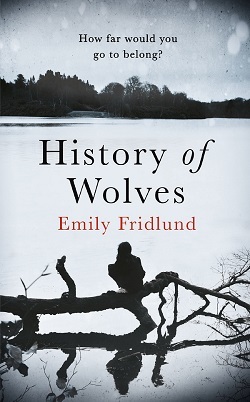
Six reading groups shadowed the Man Booker Prize this year. Each group read and reviewed one of the shortlisted titles. Here, we focus on History of Wolves by Emily Fridlund.
History of Wolves
Linda, age 14, lives on a dying commune on the edge of a lake in the Midwest of America. She and her parents are the last remaining inhabitants, the others having long since left amid bitter acrimony. She has grown up isolated both by geography and her understanding of the world, and is an outsider at school, regarded as a freak.
One day she notices the arrival of a young family in a cabin on the opposite side of the lake. She starts to befriend them, first their four-year-old son Paul, and then his young mother Patra, who is also lonely and isolated. For the first time she feels a sense of belonging that has been missing from her life.
Leo, the father, is a university professor and an enigmatic figure, perpetually absent. When he returns home, Linda is shunned by the family unit. Desperate to be accepted again, she struggles to resume her place in their home and fails to see the terrible warning signals, which have such devastating consequences.
Emily Fridlund was born in 1979 and grew up in Minnesota. She holds an MFA from Washington University in St. Louis and a PhD in Literature and Creative Writing from the University of Southern California. Her collection of stories, Catapult, was chosen by Ben Marcus for the Mary McCarthy Prize and will be published by Sarabande Books. She lives in the Finger Lakes region of New York. History of Wolves is her first novel.
Reading Group review

“We all agreed that this is a beautifully crafted novel. They say ‘you can’t judge a book by its cover’ but in this case the illustrator has captured the feeling of the book perfectly. The word most often used was ‘bleak’. The landscape is as bleak as the lives of the people in the beginning. None of us want to live in Minnesota (at least not by that lake anyway).
We are products of our childhood experiences and at the same time we construct our own meanings and even realities. Madeline, Mattie, Linda, the CEO, the Professor has many identities and a narrow set of relationships within a group of quite ‘odd’ characters. We don’t know much about her parents and what we want to know, she doesn’t ask.
There was not much that was endearing about any of the characters. Even Paul was a bit off putting despite being only four years old. We wanted to love him but then heard him say things which shouldn’t have come out of a four year old. We were uneasy about his family long before the critical event of the book.
In the end we concluded that this was almost a nature story with the characters acting according to a kind of ‘survival of the fittest’ model. Sometimes being the fittest means you have to be quite mean."
Get involved
Read reviews of History of Wolves and leave your own. Find out more about the book by downloading a free Readers’ Guide and a supporting booklist featuring similar titles.
Meet all of the shadow reading groups for this year.
If your reading group would like to apply for similar opportunities in the future, please visit our Noticeboard.
You can listen to the brilliant Man Booker Prize podcast audio series on Soundcloud with Joe Haddow from Radio 2.
Keep up to date on all the latest reading group news – sign up for our free monthly e-newsletter.
Share your thoughts about the Man Booker Prize on Twitter and Instagram using #FinestFiction and #ManBooker2017.
For more information, visit the Man Booker Prize website.


